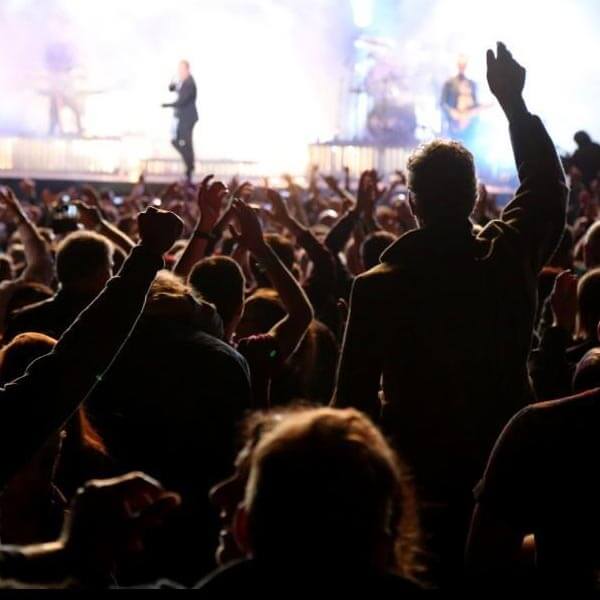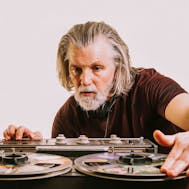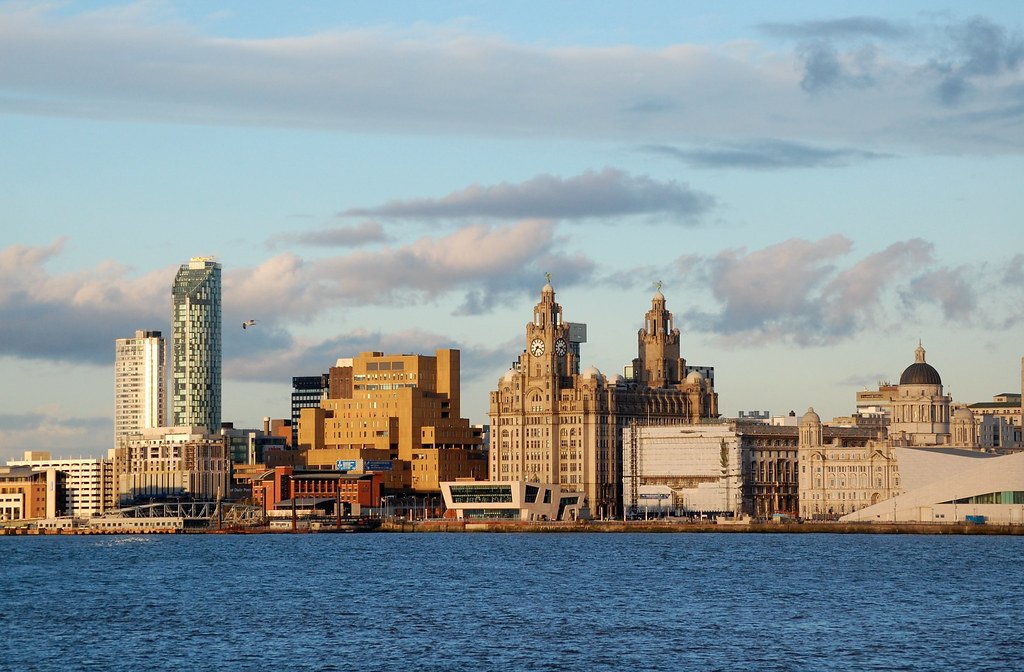
Greg Wilson interview: Strange Days
Greg Wilson chats with Marko Kutlesa about the ideas and influences behind his next Super Weird Happening event, Liverpool's cultural movements and much more.
Skiddle Staff
Last updated: 24th Mar 2017
Liverpool based DJ Greg Wilson has been no stranger to Skiddle since he revived his career in the early 2000s. Reinvigorated, he has taken his electrofunk and disco sounds around the world, eclipsing his achievements as one of the pioneers of such a then fresh electronic sound in the north of England during the 1980s.
The energy he has brought to his latter-day career as a DJ he has mirrored in other directions, his mixes, his edits and his storytelling, much of which has been presented in an extensive blog. He has also applied his enthusiasm and imagination in curating several events, the next of which happens at The Florrie in Liverpool on April 1st.
The seventh in a series of programmes presented by Greg's label Super Weird Substance, this 14 Hour Super Weird Happening sets itself up as a one day indoor festival, utilising live music, DJs, exhibitions, live art, spoken word, panel discussions and performance. The event takes place fifty years on from The 14 Hour Technicolor Dream, a countercultural event at the Alexandra Palace in London and similarly aims to unite some seemingly disparate groups and themes.
Guests include Alan Moore, writer of much loved comic novels V For Vendetta and Watchmen, and alongside his works other themes will take in master media manipulating rave act The KLF, Liverpool's black music scene, the legacy of Eric's and its founder Roger Eagle and wherever the vibrant happening steers its course. All proceeds from the event will go to the fundraising efforts of its stunning host, The Florrie.
Marko Kutlesa sat down with Greg to quiz him about the event and explore further some of its themes.
Part of the inspiration for the 14 Hour Super Weird Happening is the The 14 Hour Technicolor Dream which took place at Alexandra Palace in 1967. What ideas and concepts from those days do you think still hold particular relevance today?
The hippie counterculture has been accused of being over-idealistic and naïve, but it was their unfaltering belief that they could make the World a better place that led to many positive developments, not least in helping alter peoples’ perceptions with regards to racism, sexism and other outmoded attitudes that were rife in society back then. The cultural changes were vast, with artists from various disciplines exchanging ideas and influencing each other’s approaches in new ways.
A catalytic gathering like the 14 Hour Technicolor Dream was key to helping create the conditions for this type of connectivity and, apart from being a spectacular event, served to bring people together, sparking subsequent dreams and schemes.
How do you think the KLF and their contributions differ from those of their peers in the late 80s/early 90s UK rave scene and will they still hold such relevance to today's youth culture when/if they re-emerge later this year?
They were coming from a completely different angle, which is, of course, what set them apart, yet they were extremely well versed when it came to pop music/the record industry – Bill Drummond had met Jimmy Cauty when he worked in the A&R Dept at WEA and signed Cauty’s band Brilliant, unleashing Stock, Aitkin & Waterman in the process – the trio producing the Brilliant album, with the money they were paid enabling them to set up their studio (incidentally, Youth, who was also a member Brilliant, will be introducing Jamie Reid and Alan Moore at the Happening as well as playing an ambient selection).
Rave was what was happening at the time, which is why they chose that direction – they never set out to be a rave act and were far more hip-hop influenced with their earlier Justified Ancients Of Mu Mu releases. One thing I’m sure about is that Drummond & Cauty’s re-emergence this year will not be what’s expected of them, but what they’re compelled to do. As to their relevance to contemporary youth culture – their example of bypassing the norm to do things on their own terms is sure to be inspirational to young artists who feel constrained by the existing culture. John Higgs’ wonderful book, ‘The KLF: Chaos, Magic And The Band Who Burned A Million Pounds’, continues to spread the word.
Isn't burning a million quid a distinctly middle class/upper middle class thing to do? Do you personally feel that a million could quid could be put to a lot better or more worthy use than destroying it as an art statement?
Isn’t the aim of the middle/upper classes to acquire money, rather than burn it? In a conventional sense you can do so much with a million, which is why it was so controversial when they torched it, but it wasn’t a conventional act. At the time everyone thought it was some sort of publicity stunt for their next project, or that it hadn’t happened at all, but was just a further example of KLF tricksterism. However, the fact that, 23 years on, this clearly wasn’t the case – there was no hidden agenda – makes the whole thing all the more intriguing. They clearly had deeper/more personal reasons for their actions.
What kind of impact do you think Roger Eagle had and on which particular scenes and do you think it would be possible for a DJ to hold a similar amount of cultural significance and play such a significant role as a catalyst today?
Roger Eagle was a cultural giant, both in Manchester during the 60s, when he was DJ at the great R&B/soul club The Twisted Wheel, and later when he turned his attention to the psychedelic Magic Village, and then in Liverpool in the 70s, where he initially promoted gigs at The Stadium before opening Eric’s on Mathew Street, where The Beatles had played so many times at The Cavern throughout the early 60s.
He acquired so much respect that he was able to stop young musicians listening to ‘them’ (‘them’ being The Beatles). He understood that the legacy of the Fab Four was stifling the Liverpool music scene, and there was a necessity to move on – to create their own scene.
I believe that, as rare as they are, these cultural catalysts have, and will always thrive where the conditions are ready for them to do so. Liverpool was primed for Roger Eagle in the 70s, but had he turned up in Leeds, for example, the stars may not have aligned.
Why is Alan Moore more important than a guy who just writes comics and which of his character creations do you think will live in the public consciousness for the longest and why?
It’s because his approach to comics was unique – he wanted to get much much deeper than the ‘zap! pow!’ type portrayal of superheroes. It’s similar to The Beatles with Sgt. Pepper’s, when pop music was declared art as a result of their endeavours, whereas pop had previously been regarded, by most people, as throwaway. Alan Moore’s Watchmen could be described as the Sgt. Pepper’s of comics – like the album, it revolutionised its format.
Alan’s work has a habit of seeping out of the pages of his comics into the real world. The V For Vendetta masks that Occupy and Anonymous adopted are a perfect example, as was the blood splattered smiley badge The Comedian was wearing on his death, in the opening frames of Watchmen, which, via ‘Beat Dis’ by Bomb The Bass, became the emblem (minus the blood) of the acid house movement. You could say that the messages of both of these comics hit as hard now as they ever did, perhaps even more so given recent political developments.
As for which character creation, who knows? – depends on how the world unfurls. I don’t know about the longest lasting, but The Mandrill is certainly the most urgent!
Do you believe in magic and how would you try and convince someone who ardently disbelieves in such that it does exist?
Alan Moore’s belief that art and magic are the same is something that certainly resonates with me. For example, someone has the idea to paint/sculpt/record something – at this point it’s but an idea, with nothing actually painted, sculpted or recorded. The rabbit out of the hat bit is making the idea a reality – creating something that didn’t previously exist. This involves the fool’s leap of following the idea through.
Often it’s easy for people to come up with the ideas and talk the talk, but carrying them through is another matter completely – this separates the artist from the dreamer, the doer from the thinker. For many people its safer just to have the idea – the moment they make it real they’re open to criticism, which might wound their artistic sensitivity, making it easy for them to keep the idea safely stored away as a what if.
I’d never try to convince someone of the existence of magic. If they don’t believe they won’t see – you have to have a bit of magic about you to understand its presence in the world around you.
Why do you think Liverpool's connection with black music and certainly the music of its own black community is less visible/audible and celebrated than it is in other cities such as London, Bristol and Manchester?
That’s a question I’ve never been able to satisfactorily answer. I suppose it boils down to a unique combination of factors. That said, Liverpool band The Real Thing had big success in the 70s, but people were snobbish about black music at the time, not accepting British acts as authentic, like the US and Jamaican artists. There was a flourishing black music scene in Liverpool during the 60s, led by The Chants, which was undoubtedly held back by the prejudice of the time.
There were definite racist undertones in Liverpool during the 60s and 70s – there were very few clubs in the city centre that welcomed black people. The Timepiece, where DJ Les Spaine worked during the 70s was hugely influential. What Les played first, the other DJs played later. He, along with Radio Merseyside soul show presenter, Terry Lennaine, was at the vanguard of things in this part of the world, and I was one of the young DJs soaking up their inspiration. Liverpool was one of the leading cities in the UK back then when it came to hearing the latest black music (Roger Eagle was also getting Probe to import industrial amounts of Jamaican dub). Whilst much of the region was immersed in Northern Soul, Liverpool was funk central.
However, in the aftermath of the Toxteth riots in 1981, racist door policies stunted any chance of black music, or at least the cutting-edge black music, thriving in the city centre. I ended up in Manchester, at a city centre club, Legend, which welcomed a predominantly black audience on my nights – such a night wouldn’t have been possible for a DJ like me in Liverpool at the time. Whilst Liverpool closed in with the ‘80s, Manchester opened up, becoming increasingly cosmopolitan and creating the conditions for what happened towards the end of the decade – the black and white fusion of ideas setting it at the cusp of dance culture as rave exploded.
Liverpool gradually got itself together, the Cream era of the 90s giving it fresh self-confidence. Now I look around me and I see a city much more at ease with itself and its inhabitants, providing the foundation for the type of exchanges that enrich culture, rather than restrain it.
Of all the cultural movements Liverpool has played a part in over the last half century plus, you've set up this event so that it can encompass many of them. Yet there's no specific dedication to Liverpool's most significant cultural contribution in that period; The Beatles.
Do you think that in any way the music of The Beatles is so omnipresent, their achievements so revered, that it is difficult for contemporary youth culture to appreciate or laud their often radical contributions as part of an alternative or counter culture setting? It is, after all, the job of new youth culture movements to question or rebuff the accepted wisdom of the past, no?
I’m always celebrating The Beatles - whenever I can, wherever I can - in my own way. Like you say, they’re omnipresent – you celebrate them without specifically mentioning them. The 50th anniversary of 1967, which is one of our themes, also acts, of course, as a celebration of The Beatles - their fingerprints all over that year, more than any other.
They’ll continue to connect with young people, if they’re receptive - the music is undeniable once heard. Some will go beyond surface appreciation, utilising the Internet to help them understand what was happening during that decade to unleash such a phenomenon.
The emerging youth culture can take from the past and do with it as they deem fit – that’s their heritage as far as I’m concerned. It’s their decision, not ours.
You've claimed in the past that Liverpool is on the up and up. Many of Liverpool's key cultural contributions from the past have come from individuals or mavericks rather than localised movements or cabals. Do you think there is anything the city of Liverpool or its communities can do together in order to facilitate a resurgence in its cultural offerings?
It’s always about strong individuals infecting the collective – visionary people prepared to put themselves on the line for an idea or an ideal. You need people to lead – try to do things by committee and the ideas may lose their urgency as everyone has their often-conflicting thoughts on the matter and the moment is lost as the energy evaporates.
That’s not to play down collectives in any way, they’re vital for the next stage, when people pull together to push the ideas through, and individuals are encouraged to come forth with ideas of their own to bring to the collective, but we need those mavericks to be bold and adventurous on our behalf, setting the wheels in motion by taking the risk – at which point we should support their vision with all we have to offer.
The event is taking place on the first day in April. What, if any, April Fools jokes do you have planned or is an event called the 14 Hour Super Weird Happening to be taken more seriously than to be expected to indulge in such frivolous mischief?
I like what John Lennon once said about being very serious about being non-serious. I suppose that’s the balance of thoughtfulness and frivolity we’d hope to achieve.
Super Weird Substance emerged as the result of a fool’s leap. Alan Moore had talked about this in an interview, and it really left an impression – he said "anything of any value in our lives – whether that be a career, a work of art, a relationship – will always start with such a leap. And in order to be able to make it you have to put aside the fear of failing and the desire of succeeding."
We set up the label on April 1st, so when we saw that this was a possible date for the Happening, we couldn’t let it pass. The tarot card, The Fool, of course, is symbolic of creativity – taking that step into new beginnings.
The first hour of the event is between 11am-12pm, before April Fools’ is past and gone – we’re calling this hour the ‘parade of fools’ and giving a gift to everyone who arrives before midday, although, apart from that, we haven’t got a clue what’s going to happen, so more fool us.
Tickets are no longer available for this event
Read more news
Articles you may be interested in
related artists
Upcoming Events At The Florrie , Liverpool
Here are the next 2 upcoming events At The Florrie , Liverpool





























